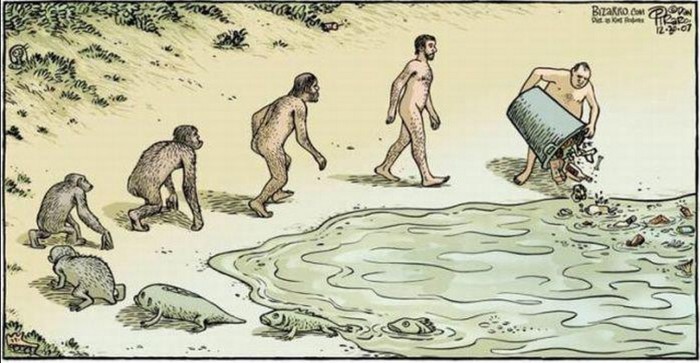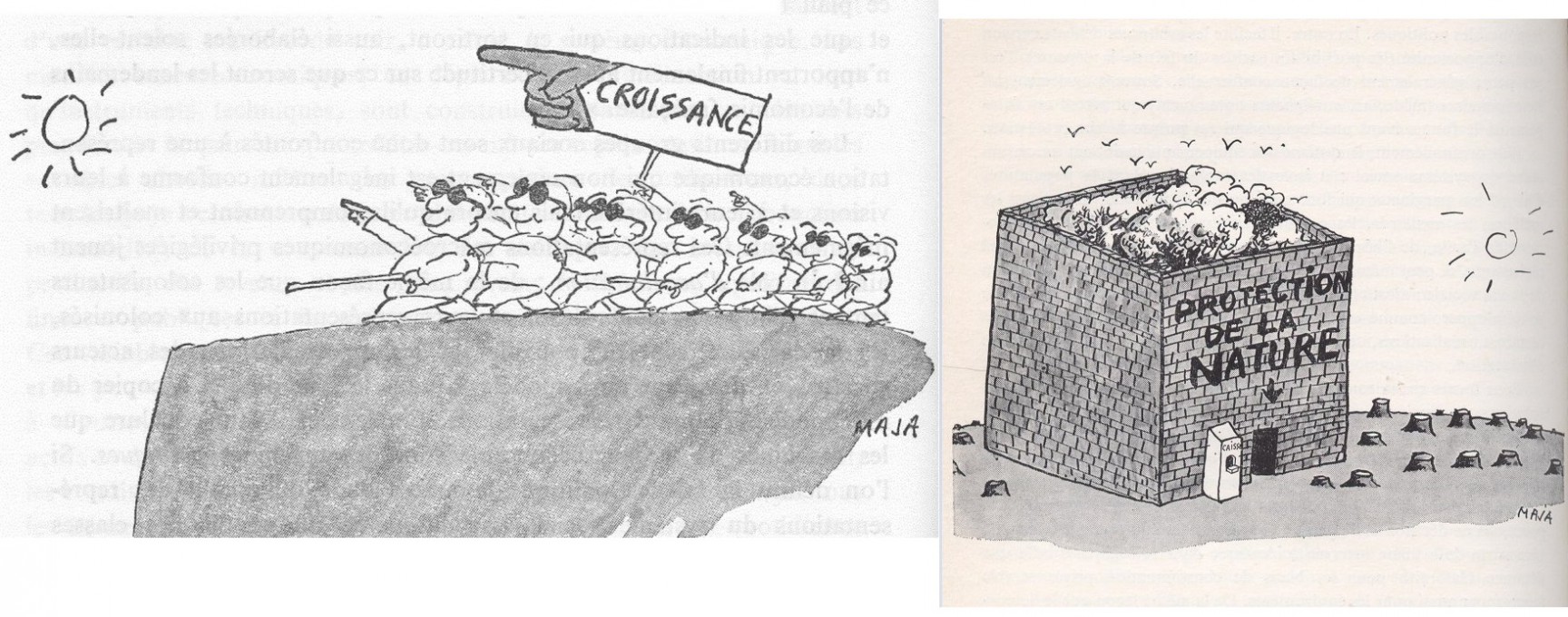An Attempt to Save the World from Specialists’ Narrow Mindedness and Philosophers’ Plagiarism of the Past.
“Of course, our failures are a consequence of many factors, but possibly one of the most important is the fact that society operates on the theory that specialization is the key to success, not realizing that specialization precludes comprehensive thinking.” Buckminster Fuller (Spaceship Earth: Manual of operation, Circa 1965)
 “By being specially adapted to acquire a particular kind of information, most structures [species and specialists] are tied to a very narrow, rigid program, their inbuilt computing mechanisms containing `hypotheses’ to which they blindly adhere. If circumstances arise that were not `foreseen’ by the adaptive process that produced them [evolution and Academia], a structure may transmit false information which it cannot be taught to correct.” (Konrad Lorenz, Behind the Mirror, “1973) (My brackets)
“By being specially adapted to acquire a particular kind of information, most structures [species and specialists] are tied to a very narrow, rigid program, their inbuilt computing mechanisms containing `hypotheses’ to which they blindly adhere. If circumstances arise that were not `foreseen’ by the adaptive process that produced them [evolution and Academia], a structure may transmit false information which it cannot be taught to correct.” (Konrad Lorenz, Behind the Mirror, “1973) (My brackets)
What were we thinking?
Source Edited by Andre Gaudreault
KANTIAN RHINO:

“…let us once try whether we do not get farther with the problems of metaphysics by assuming that the objects must conform to our cognition.” Kant Vs A priori knowledge rhinos use to define their reality.
What are we thinking?!

The ultimate consequence of living in a reality defined for our own sake while using uncriticized “a priori” concepts: More Plastic Than Fish in Our Sea
After the work of Copernicus and others had demonstrated that the earth was not the center of the universe but only a part of a much larger system, the world began to change its vision of reality. The process took hundreds of years. Today, because humanity has become a dominant influence on earth, we are faced with another such change: from nature being a convenience for people, to people being a part of nature. The scope is similar. The practical significance is of far greater consequence than the Copernican revolution but we have only a generation to complete the change. ~Mike Nickerson, Change The World I Want to Stay On, 1977.
A CRITIQUE OF PURE PROGRESS by Andre Gaudreault (aka Gaudwin or AGaudwin)
Progress has become a maladaptive anomaly of nature because it has transformed the human economy — our collective behavior initially in tune with the fundamental principles of nature — into an alienated mode of profit production, beneficial for a developed minority, detrimental to the rest of the human race, and destructive for the whole planet.
Academics, politicians, and business people are failing because all their analyzes of this state of affairs are based upon a fundamental misunderstanding of space and time that precludes them from understanding that specialization and everything that ensued from it (science, progress, and the growth-economy) is an anomaly of nature.
If it were not the case, they would define humanity’s present existential crisis in solvable terms, which they evidently cannot! And the reason why they are so clueless is the fact that “There are few ideas that, like our notion of time, shape our thinking about literally everything, with major implications for physics and beyond—from climate change to the economic crisis” (Lee Smolin, Time Reborn)
You do not understand how your ingrained notion of time is affecting your understanding but you will when I formulate my theory. If I cannot tell you now before I formulate it it is because time is to our understandng which is uique for all individuals while space is to our perception which is the same for all individuals.what space is to our perception.
And this relation is antithetical in that we can move in space, but nobody can be at the same place simultaneously. In contrast, we cannot move in time, but everybody is at the same instant, notwithstanding Einstein’s who has it wrong, according to my theory.
Perception and understanding are in the same dialectical relation since everybody perceive the same think when at the same place while eventhough everybodies is at the same instant in time their understanding are idiosyncratic.
 We have all the resources to solve the problems created by our inconsiderate behavior. To use these resources in the most efficient and economical manner, though, we must gain a fresh perspective of ourselves and of our relations to nature (I.e., Know thyself as a species as in “Species are individuals”). What we need a human paradigm shift that would allow us to “evolve” a collective consciousness, a theory of everything (ToE), enabling us to use all the resources at our disposal to solve the existential problem that our selfish uses of modern science have created in the twentieth century. And this paradigm is based on a new understanding of time allowing us to “perseive” our onenesss with the universe. Boudhists monks get in touch individually with this oneness true meditation, we have to do it collectively true a scientific understanding.
We have all the resources to solve the problems created by our inconsiderate behavior. To use these resources in the most efficient and economical manner, though, we must gain a fresh perspective of ourselves and of our relations to nature (I.e., Know thyself as a species as in “Species are individuals”). What we need a human paradigm shift that would allow us to “evolve” a collective consciousness, a theory of everything (ToE), enabling us to use all the resources at our disposal to solve the existential problem that our selfish uses of modern science have created in the twentieth century. And this paradigm is based on a new understanding of time allowing us to “perseive” our onenesss with the universe. Boudhists monks get in touch individually with this oneness true meditation, we have to do it collectively true a scientific understanding.
***

These illustrations of the state of the world touched me personally since I had already been aware, in the mid 70s, that 80% of the bodies of water in which I had swim 20 years earlier were polluted.
NB As you can see, my background is French. So don’t look at the overall style of this introductory preamble, nor at the odd structure of some sentences, but rather at their content.
It is my coming across these illustrations in the mid-70s that prompt me to go back to the university after an eclectic BA equivalency, to find out what is wrong with us humans that we cannot use the knowledge that we have to solve the problems created by progress. I decided to undertake this search as a generalist theoretician, after reading in the late 70s in Buckminster Fuller’s Operating Manual of Spaceship Earth that: “…specialization precludes comprehensive thinking,” And after having been secured in my apprehension to undertake such a major project at the advanced age of 34 by Konrad Lorentz’s saying that: “Specialists, by knowing ever more and more about less and less, will finish knowing everything about nothing.”
***
To find out as a species from a new perspective what is our true relation to reality, we need a human paradigm that would be significant to all honest people, whether sexes religions, or nationalities they would be. “Karl Popper defined scientific paradigms as shared belief systems.
As science progresses, scientists realize that these beliefs are mostly false and move to a new paradigm.” (Source, my emphasis) Now, what is fundamentally wrong for all of science and humanity is the deep-rooted presumption underlying the scientific method and the whole edifice of human reason, that reality is “objective,” that there is a reality “out there,” independent of us.
For a paradigm shift to become necessary, an anomaly of knowledge that exists with respect to earlier theories needs to be recognized (Popper). I will show in the graph below that the unrecognized anomaly preventing us from solving the actual humanity’s existential problems is progress itself, due to the inability of science and philosophy to define its proper role in evolution.
Exponential progress:
This is the graph I presented to the late Nora Cebotarev of the University of Guelph ca 1988-9, who accepted me in the Master program of Sociology and Anthropology without me having follow one course of anthropology or sociology in my previous two general BA.
To execute such a “shift” in our collective behavior, as we absolutely must at the moment, we need to question and revolutionize our ways of thinking about our relation to reality. Three hundred years ago, Immanuel Kant already acknowledged that humanity needed to undergo such a revolution. However, his understanding of evolution was lacking. Indeed, he did not make his Critique of Pure Reason within the context of evolution, as he surely would, had evolution been an established fact at the time. And neither was he aware of the ill effects that progress would have on our living environment. — To which ill effects, his “incomplete” Critique ( not taking evolution into consideration) contributed in grand part, as I will show in my dissertation.
Today, if specialized scientists do not recognize progress as an anomaly of evolution, it is because their research grants prevent them from acknowledging the truth about the ultimate side effects of their work. Or, as Michael Lewis already said more succinctly about the profiteering Wall Street workers who, for their part, create the economic crises: “ If you pay someone not to see the truth, they won’t see the truth.” (Source)
CLICK TO ENLARGE

“Learned Generalist” was added to the original
In passing, I must say that of course, scientific research is good for humanity. However, in nature, everything that is beneficial for a species, within a given habitat, inevitably creates pressures on the other competitive species of the same natural habitat, forcing the latter to vary their behavior evolve or go extinct, and the former to adapt to these new variations.
We are social animals. Our natural habitat is the whole earth. Our collective activities create pressures on all the other species of the planet. We don’t have any competition anymore. Nothing can regulate us. We absolutely must develop” convivial tools” to govern ourselves globally and adapt locally as a species, without destroying or misusing our natural environment. For this, we need to use all of our intellectual resources to “evolve” a collective (organic) consciousness allowing us to “objectify” the human species as a single individual (Species as individuals), thus “dialectically” becoming a type of “homo novus” aware of being one (entangled in modern terms) with our fellow human beings and with nature, and change our collective behavior accordingly.
I say “dialectically” because this understanding of our oneness with reality will be the “antithesis” of what we had to do when we leave the security of our native forest because of climate change—or the original sin for believers—for the open and unknown Savannah. In which we had to evolve into individuals able to “objectify” our living environment and our inner self in terms of space and time. That, to be able to use tools of our own making to survive in the Savannah and to defend ourselves against feline predators, not having evolved in our previous rainforest habitat the biological means to run away from them, as antelopes do in the open Savannah.* To eventually, after some 3 million years, let our “species-serving” economy create virtual profits from a well-known but impoverished global environment while using the same unconscious assumptions about space and time that we were using in the Savannah, but which are now irrelevant to our survival. It is these unconscious assumptions that we need to lay bare if we want to have any chances to find ways to control the destructive force of nature that modern specialized science allowed us to become.
CLICK TO ENLARGE

The jungle images on the left are used coasters that I bought for a quarter in a garage sale in1990 while doing my MA in Zoo-Socio-Anthropology. These blew my mind since I was then tinkering about the concept of “form” in evolution.

Sam! Sam! Don’t do it! There’s good news! A really big war’s just broken out!
Now that we have no more competition, being the only species conscious of living in space and time and in dominant societies while still being guided by our primitive drives, we need to “create enemies,” so we keep producing new armament to feed our global ” war-economy.
These caricatures lead me to infer the following dialectical relations between nature and nurture.
***
My theory Why Jane Goodall is wrong to conclude from her anthropocentric observations that chimpanzees use “tools.”
Analogies of forms in nature and nurture:
I present this example below of tool-use in nature as a preamble to my argument that Goodall is wrong in her conclusion that chimpanzees use “tools” as we do. I will show that the “objects” that many animals use to accomplish some tasks are not “tools,” but unconscious exosomatic extensions of their bodies, which they cannot “refine” no more than they can alter the biological resources (claws, teeth, etc.) acquired through their evolutionary history.
1) Jumping insects vs.manufactured gears:
Figure 1 The gears at both ends are examples of gears that flees use to synchronize the triggering of both their back legs. Without these gears, flees indeed would not be able to jump in straight lines. The center image is an example of how we use the same lever principle in tools.
The figure above, insects vs. mechanical gears, supports my long-held contention that Jane Goodall was wrong to have concluded, from her anthropocentric observations, that “chimps use tools.” They don’t. Their use of “rocks” to crack open nuts stemmed from their evolutionary acquired ability to imitate. Indeed it is undoubtedly with stones that Homine was cracking open nuts in Africa millions of years ago. A practice that must have been eventually observed many times by chimpanzees, successfully put to use by some of them, and transmitted by imitation since then with no improvement whatsoever for all these years; like we did with our tools while discovering their underlying principles, intuitively for a long time, and then formally with science.

“TOOLS” BUILT USING THE SAME PRINCIPLES
Chimps do not use tools to crack open nuts like we do; it is a habit they have acquired through imitation. When they finally “get it,” it simply becomes a biological extension of themselves. Adult chimps cannot teach youngsters how to use rocks, no more that they can teach them how to grow teeth. Cracking open nuts for chimps is an “exosomatic” biological process. That is why there is “no active teaching” and “adults never teach.” (see 4:55 in the video below)
Young chimpanzees have to learn for themselves at each generation. I will show in my dissertation that the reason for that is that all living entities from genes to chimpanzees live in the instant for themselves, without any spatiotemporal conceptualizations,* which are the sine-qua-non conditions for conscious tools-making and teaching. What chimps use to survive are not tools but their acquired ability to imitate.
* Maybe, they don’t even have spatiotemporal “representations” of their surroundings. They don’t have image representations as we do; they are “one” with it as our brain is with our body, and they react instinctively to the signals they receive from their environment like our brain with those receive from our body. This could explain that when something is changed in their environment, dogs don’t realize it (see below). Not receiving any stimulus from what is not there, they behave as if it was still there, having no immediate representation of their surroundings but ingrained habituations:
In accordance with Kant’s claim, non-human animals would not be able to know objects. Animals would only know impressions on their sense organs, which Kant mistakenly called perception. Kant had erroneously asserted that full, perceived objects, not mere sensations, were given to the mind by the sense organs. Perception, however, according to Schopenhauer, is intellectual and is a product of the Understanding. Perception of an object does not result from the mere data of the senses. It requires the Understanding. Therefore, if animals do not have Understanding, in accordance with Kant, then they have only Sensation, which, Schopenhauer claimed, gives only raw sense data, not perceived objects.
“For Kant, there is absolutely no knowledge of an object unless there is thought which employs abstract concepts. For him, perception is not knowledge because it is not thought. In general, Kant claimed that perception is mere sensation.
In accordance with Kant’s claim, non-human animals would not be able to know objects. Animals would only know impressions on their sense organs, which Kant mistakenly called perception. Kant had erroneously asserted that full, perceived objects, not mere sensations, were given to the mind by the sense organs. Perception, however, according to Schopenhauer, is intellectual and is a product of the Understanding. Perception of an object does not result from the mere data of the senses. It requires the Understanding. Therefore, if animals do not have Understanding, in accordance with Kant, then they have only Sensation, which, Schopenhauer claimed, gives only raw sense data, not perceived objects.” https://en.wikipedia.org/wiki/Critique_of_the_Kantian_Philosophy
We are the only species living consciously in “space and time” and in organized societies. It is in both of which that we have gained the ability to “use tools” and transmit our knowledge through teaching. It is indeed this ability to “objectify” space and time and to recognize ourselves in it, unconsciously for millions of years as hominids, and consciously for thousands as sapiens sapiens that have given us the transformative abilities to speak live in society and create tools.
Chimps are not “transformed” by their capacity to crack nuts with rocks; they will never invent nutcrackers; they are simply animals who have learned to use rocks to eat nuts, for millions of years probably. The only one who’s been transformed by their habit is Jane Goodall.
Sorry Dr. Goodall, but if my refutation of your conclusion is correct, and I am sure it is, it has to be exposed as false, since your mistaken identification of chimps to us because they use “tools” has been detrimental to humanity, since we are mental entities as different from biological animals as our everyday reality is from quantum reality. And because of this fact, which I will expose in my dissertation, your specious “findings” have had many adverse implications on our social and scientific capacities to formulate our present existential problems in solvable terms. Disturbing implications that I cannot “describe” until I formulate my theory of universal evolution in which humans are not seen as “other animals,” but as an emergent class of mental beings antithetical to instinctive animals. We are to the animal world what life is to matter and matter to energy.
Next section: De evolutionibus res naturas: A treatise of universal evolution (Work in progress)
“It is the theory that describes what we can observe.” Einstein
Work in progress




I am in fact delighted to glance at this blog posts which carries
lots of valuable information, thanks for providing such data.
I’m really enjoying the theme/design of your blog.
Do you ever run into any internet browser compatibility problems?
A couple of my blog audience have complained about my site not operating correctly in Explorer but looks great in Firefox.
Do you have any advice to help fix this issue?
First off I want to say awesome blog! I had a quick question which I’d like to ask if you don’t mind.
I was curious to find out how you center yourself and clear your head before
writing. I have had trouble clearing my mind in getting my ideas out there.
I truly do take pleasure in writing however it just seems like the first 10
to 15 minutes are usually wasted just trying to figure out
how to begin. Any recommendations or tips? Kudos!